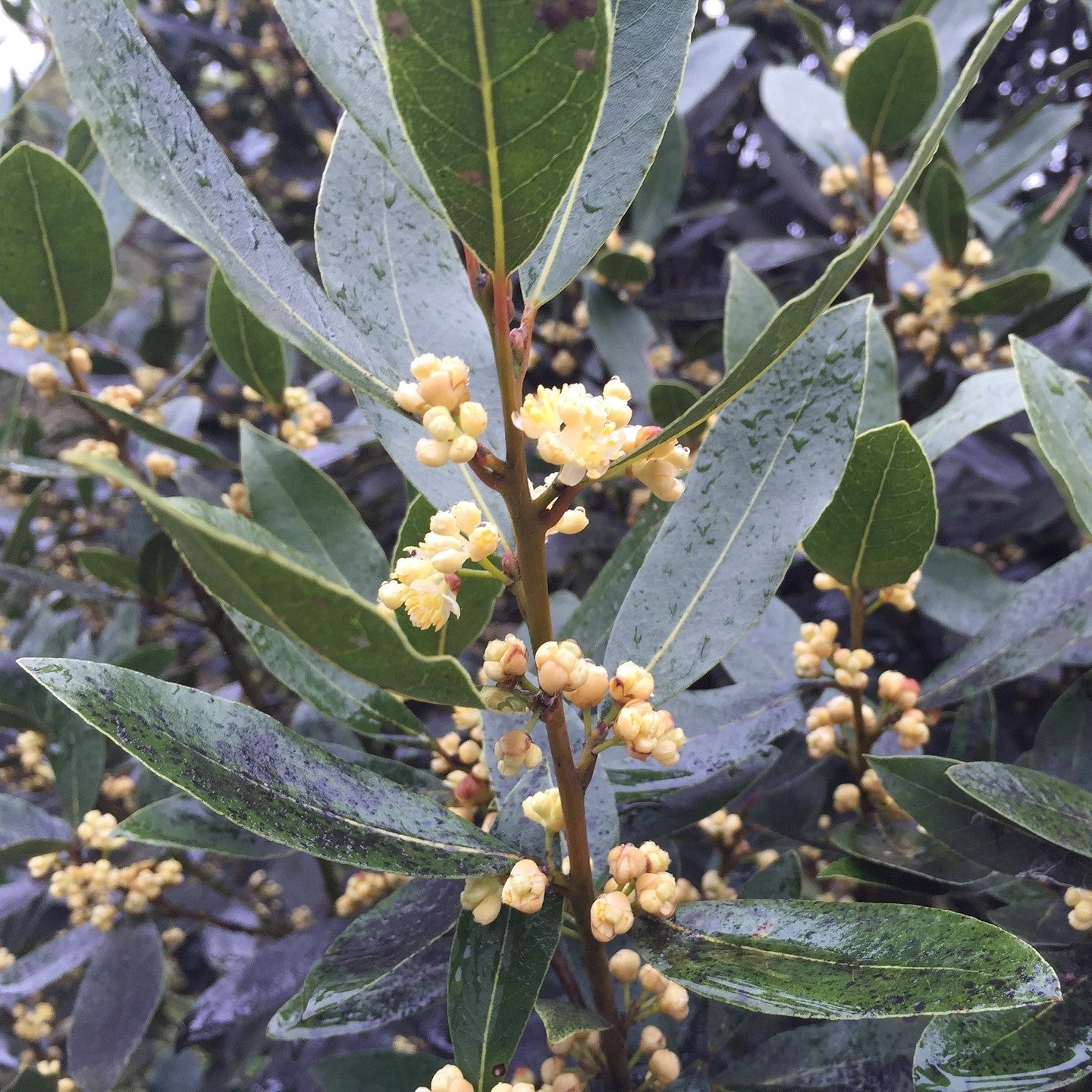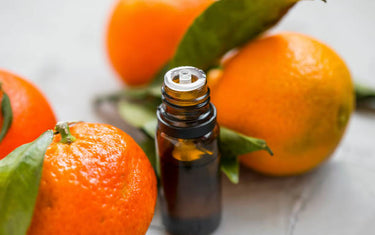5 min read / 26 January 2022 / Laura Garvin Gomez
Benefits and Uses of Bay Laurel Oil
Bay laurel was once believed to contain 'magical' disease-curing properties.

Commonly seen in gardens as hedges, the bay laurel plant has had societal significance for thousands of years.
Bay laurel was a very important plant in both Greek and Roman culture, believed to contain magical properties which could ward off evil and disease.
This ‘magic’ is now explainable by science, and bay laurel is still used for the same benefits that the Greeks and Romans considered it sacred for – namely its expectorant, antispasmodic, and insect-repellent qualities.

What is Bay Laurel Essential Oil?Not to be confused with oil from the West Indies bay tree – known as Pimenta Racemosa - bay laurel oil comes from the Laurus nobilis, otherwise known as the bay laurel tree. Produced via steam distillation from the freshly picked leaves of this evergreen tree, bay laurel oil is commonly pale yellow to pale green in colour with a refreshing yet lightly fruity scent profile. Over the years, bay laurel has been used in herbal medicines, implemented to help preserve food, and utilised as a spice for culinary applications. |
What are the benefits of Bay Laurel Essential Oil?
Originating in the Mediterranean, the bay tree spread across the world as a result of its powerful health and wellness properties.
While there is still more research to be done in certain areas, some of the most impactful bay laurel oil benefits include:
- Respiratory relief
- Managing menstrual pain
- Increasing appetite
- Insect repellent

Can bay laurel essential oil be used as a decongestant?
Bay laurel oil is perhaps most famously applied in aromatherapy circles as an expectorant.
This means that the oil can help to shift excess phlegm and mucus lodged within the respiratory tract to facilitate easier breathing and soothe additional symptoms. Adding a few drops of bay laurel to a diffuser or oil burner is therefore an extremely effective cold, cough, and flu remedy.
Bay laurel’s antimicrobial properties are also effective in preventing the return of these stubborn pathogens.
Interestingly, a study in 2020 on the effectiveness of Mediterranean herbs against symptoms of COVID-19 found that bay laurel can help to combat these issues and prevent them over time.
Alongside these miraculous benefits, bay laurel is also anti-spasmodic, which makes it great at treating coughing spells and relaxing the muscles in the chest.

Does bay laurel oil help manage menstrual pain?
Lots of people have found bay laurel useful for managing the pain of menstrual cramps, as well as regulating the menstrual cycle over time.
These pain-relieving properties are likely due to the same antispasmodic qualities that make bay laurel so great at managing coughs. The uterine muscles are relaxed by the oil upon topical application and thus allow the pain to gradually dissipate.
A few drops of bay laurel oil diluted with a carrier oil and rubbed on the abdomen may help to achieve this relief.
Aside from its usefulness for cramps and coughs, the analgesic (pain-relieving) properties of bay laurel have been suggested to be useful against a number of other ailments – including neuralgia pain - however, more research is needed in this area.

Does bay laurel essential oil increase appetite?
One of bay laurel’s more unique qualities is that it can help to stimulate appetite.
By increasing the secretion of digestive fluids, bay laurel oil can help to force a desire to eat in people whose appetites are affected by stress or a busy schedule.
By promoting a regular schedule of meals, bay laurel can help improve digestive wellness and keep us nourished, energised, and in good health.
Many people have found that applying diluted bay laurel topically to the stomach can help to trigger these effects.

Does bay laurel oil repel insects?
Bay laurel has been used as a pesticide for generations and is said to be particularly useful against mosquitoes by repelling them from the site of application.
The Greeks and Romans believed that bay laurel, through its magical powers, could protect them from plagues and other infectious diseases.
Putting two and two together in the modern age, we might guess that the oil was actually protecting them from the creatures carrying the pathogens.

How to use Bay Laurel Essential Oil
Aromatherapy
Herbaceous, fresh, yet lightly sweet, the complex notes of bay laurel essential oil make it a welcome addition to any aromatherapy collection.
A distinguished top note in perfumery, bay laurel blends extremely well with other herby oils including pine, cypress, and rosemary, as well as floral and spiced oils.
Add a few drops of bay laurel oil to your diffuser if you’re struggling with a respiratory condition like a cough or cold, as the oil’s expectorant properties can help shift these issues and encourage better breathing.
Bath
Alternatively, if you don’t have a diffuser or oil burner to hand, you could try adding some bay laurel to warm bath water and letting the combination of oil and steam naturally clear your airways.
Using bay laurel oil in the bath is also a welcome remedy if you find yourself suffering from unpleasant menstrual cramps.
Massage
Another effective way to combat menstrual pain, and indeed other types of pain in the body, is through a restorative massage.
Combine some bay laurel oil with a carrier oil and apply as needed onto painful areas. The antispasmodic properties in the oil can help calm these aches as well as provide relaxation in the muscles.
Bug sprays
Spraying areas in your home that you want to keep bug free with a solution of bay laurel, water, and an emulsifier like dish soap, could help to keep bugs at bay.

History of Bay Laurel Essential Oil
Bay laurel was considered sacred in Greek mythology, as a result of the myth of Apollo and Daphne, a nymph. Apollo falls madly in love with Daphne, but she does not reciprocate the emotion, so asks the Gods for help by turning her into a bay laurel tree.
Apollo, still in love, proceeds to crown himself with the leaves of the tree, and declares it as a sign of peace, divinity, and joy. Greeks and Romans then utilised this myth and would wave bay laurel leaves in the air as a sign of celebration and honour.
This tradition continued through ancient societies into the Middle Ages, where scholars and distinguished men were crowned with bay laurel as a result of their successes. It is from this that the term “Poet Laureate” came to be.

Bay laurel’s wide array of uses has led many to wonder why it is often neglected in conversations about aromatherapy.
However, even in the last couple of years there has been some exciting research, and it seems we are positioned to discover much more about this oil in the years to come.
|
Product Name |
100% Pure Bay Laurel Essential Oil |
| Botanical Name | Laurus Nobilis |
| Scent Type | Herbs |
| Benefits & Uses | Decongestant, Insect Repellent, Pain Relief |
| Suitable for Diffusers? | Yes, this bay laurel essential oil is perfect for diffusers. |
| Suitable for Candles and Soaps? | Yes, this bay laurel essential oil is perfect for candle and soap making. |
| Extraction Method | Steam Distillation |
| Bottle Type | Tamper proof and UV resistant |










